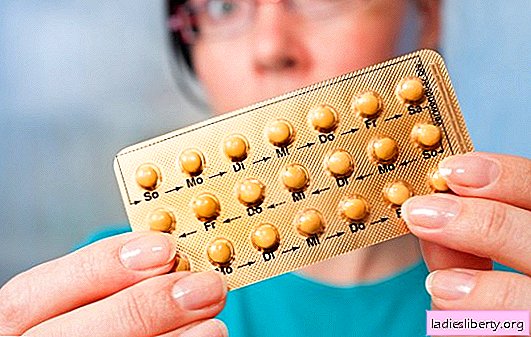
Birth control pills are a popular means of preventing pregnancy in developed countries. According to recent studies, oral contraceptives can increase the risk of thrombosis, depression and even jealousy. What studies have been conducted in recent years, and what have they identified?
1. Thrombosis
A 2015 report from the University of Bremen clearly states: "birth control pills increase the risk of thrombosis."
Hormonal drugs of the 3rd and 4th generation most often increase the risk of blood clots in the vessels.
Thrombosis develops in 5-7 of 10,000 women taking levonorgestrel (second-generation tablets). In people taking drugs of 3 or 4 generations (gestodene, desogestrel, drospirenone), the risk is 1.5 times higher.
2. Weight gain
In some women, estrogen preparations stimulate fluid accumulation in body tissues.
An increase in intercellular fluid leads to an increase in body weight.
13 other researchers at the University Hospital in Stockholm found that pills increased hunger.
3. Sexual issues
After stopping the intake of hormones - estrogen or progestogen - the concentration of male sex hormone in most women decreases.
Testosterone is responsible for sexual aversion.
In a French study, it was found that in some women (about 25%), the concentration of testosterone remains increased even after the end of therapy.
4. Migraines and headaches
The reason for the "hormonal" migraine is a decrease in estrogen levels in the blood while taking pills.
If a woman suffers from migraine with aura, the World Health Organization recommends that hormone therapy be completely abandoned.
Birth control pills in such people increase the risk of stroke by 68%.
5. Depression
According to a new study by the University of Aachen, pills have a significant effect on the psyche of women. The empathic behavior of 73 women from 3 different groups was studied.
The result was clear: women who took hormonal supplements could not correctly understand the emotions of other people. They showed less compassion than women with a natural cycle. Daily use of pills also makes it difficult to interpret and express female feelings.
Another scientific study published by the University of Copenhagen in 2016 showed that pills increase the risk of depression. Scientists have studied the data of more than a million Danish women aged 15 to 34 years.
People who received hormone therapy were 23% more likely to get depression.
In March 2017, researchers from the Carolina Institute published a report on the effect of hormones on the psyche of women. The study involved 340 healthy women aged 18 to 35 years. The evaluation showed that a group that did not take any hormonal supplements had a low risk of depression.
6. Suicidal thoughts
According to a study in 2018, oral contraceptives increase the risk of suicide.
In the winter of 2018, the Federal Institute for Drugs and Medical Devices (BfArM) included this side effect in the instructions.
If mood swings and depressive moods occur, it is recommended to consult a doctor immediately.
7. Enhancing jealousy
Based on the results of a new study in the journal Evolution and Human Behavior, oral contraceptives reinforce jealousy. Studies have shown that such women exhibit constant jealousy throughout therapy.
People who used hormonal contraception 2 years after the start of a relationship had a higher level of jealousy.
In this context, the question arises of how the action of synthetic hormones contributes to the development of this negative character trait. Scientists believe that the side effect is due to the action of estrogen. Research shows that hormonal changes can affect many aspects of relationships.
Less common side effects are an increased risk of cervical cancer, myocardial infarction, and increased blood pressure. Before starting hormone therapy, any woman needs to weigh the risks and benefits, and consult a gynecologist.











